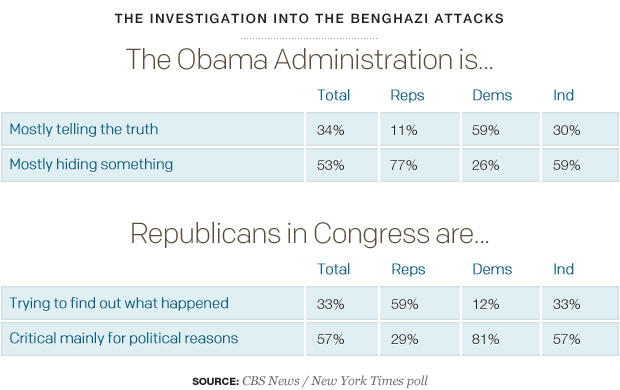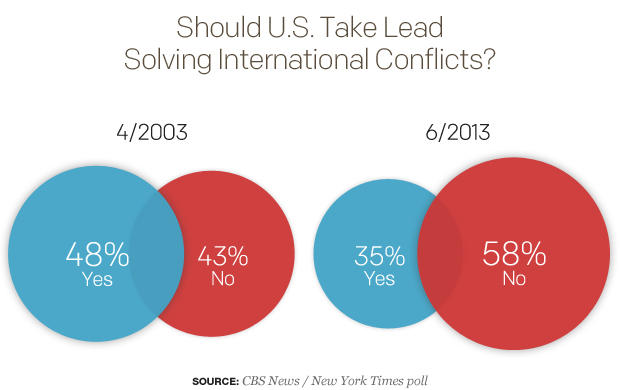Benghazi: Majority thinks administration is hiding something
Poll analysis by Sarah Dutton, Jennifer De Pinto, Anthony Salvanto, and Fred Backus
Amid investigations into the terrorist attacks on the U.S. Consulate in Benghazi, Libya, a majority of Americans - including more than three in four Republicans (77 percent) and six in 10 independents (59 percent) - think the Obama administration is mostly hiding something on the issue of Benghazi. A majority of Democrats (59 percent) think the Obama administration is mostly telling the truth.
- Poll: Most say IRS targeting was politics-driven
- Poll: More Americans have a positive view of the economy
- More coverage: U.S. consulate attack in Benghazi
But most Americans (57 percent) also think the Republicans in Congress have been critical of the Obama administration's handling of the Benghazi attack mainly for political reasons - including eight in 10 Democrats (81 percent) and most independents (57 percent). Most Republicans (59 percent) think that Republicans in Congress have been critical because they want to find out what really happened.
A majority of Americans (59 percent) say they are following news about the investigations into the Obama administration's handling of the attacks in Benghazi at least somewhat closely, including a quarter who are following it very closely - though Republicans and independents are following the issue more closely than Democrats.
The Threat of Terrorism, the Drone Program, and Guantanamo Bay
In the wake of President Obama's speech on national security, more Americans continue to think President Obama's policies have made them safer (36 percent) rather than less safe (28 percent) from terrorism. The percentage that says less safe is up from 2011, the last time the poll asked the question, and has returned to where it was in 2010.
Specifically, Americans continue to show widespread support for the use of unmanned drones to carry out attacks against suspected terrorists in foreign countries. Seven in 10 Americans favor the practice, including majorities of Republicans, Democrats, and independents.
Still, most have concerns. Forty-seven percent of Americans - including 40 percent of those who favor the drone program - say they are very concerned about U.S. drone attacks killing or harming innocent civilians, and another 37 percent of Americans overall are somewhat concerned.
Americans are less concerned about two other criticisms of the drone program: just 22 percent are very concerned it will damage the image of the U.S. and just 21 percent are very concerned that there isn't enough oversight.
The public more divided on another controversial measure: whether or not the U.S. should target and kill American citizens in foreign countries who are suspected of carrying out terrorist activities against the U.S. While 50 percent favor this practice, 43 percent are opposed.
Meanwhile, the military prison at Guantanamo Bay, which President Obama had advocated closing, still finds support among the American public. Fifty-eight percent would prefer it stay open. However, this has often been a source of partisan divisions: Republicans are more likely to want it in operation, while more Democrats want it closed.
Other International Threats: Cyber Attacks
As a new kind of destructive warfare, cyber-attacks against computer systems, has recently made headlines, two-thirds say the danger is very serious, and nearly all say it is at least somewhat serious.
And most say the U.S. isn't prepared to deal with cyber-attacks.
Americans would also prefer the U.S. not engage in this kind of warfare against other nations.
Other International Threats: North Korea and Iran
Americans continue to see both North Korea and Iran as a threat, but ones that can be contained without military intervention. Six in 10 say so, while one in five don't see either as a threat at all. Less than one in five thinks either country is a threat that requires military action now.
But most Americans would support military against Iran in order to prevent it from producing a nuclear weapon.
The Conflict in Syria
As the violence continues in Syria, six in 10 Americans continue to say the U.S. does not have a responsibility to get involved there. Reluctance to get involved has not changed substantially as the conflict has dragged on. Most Republicans, Democrats and Independents agree.
In general, Americans don't see a lead role for the U.S. in solving international conflicts. This is different from 10 years ago, in the early says of the Iraq War, when Americans were more divided on this principle.
There is more partisan agreement than disagreement on this. Though Republicans are a little more likely than Democrats to support an involved international role for the U.S., most of them don't think the U.S. should take the lead in international conflicts.
___________________________________________________________
This poll was conducted by telephone from May 31-June 4, 2013 among 1,022 adults nationwide. Data collection was conducted on behalf of CBS News/The New York Times by Social Science Research Solutions of Media, PA. Phone numbers were dialed from samples of both standard land-line and cell phones. The error due to sampling for results based on the entire sample could be plus or minus three percentage points. The error for subgroups may be higher. Interviews were conducted in English and Spanish. This poll release conforms to the Standards of Disclosure of the National Council on Public Polls.


